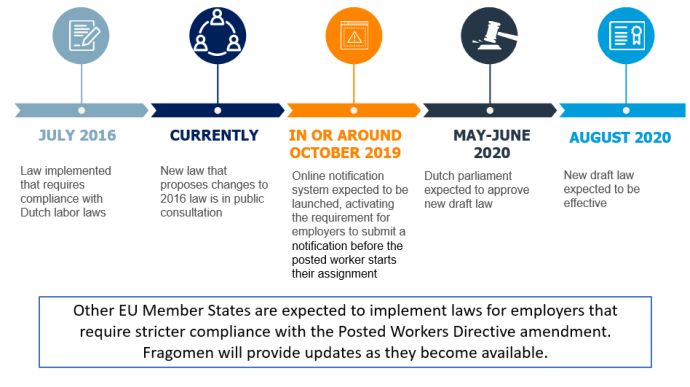At a Glance
- Employers posting workers in the Netherlands will need to file an online notification before the foreign national commences work in the Netherlands, once the government launches an online system later this year.
- Additional employment protections for posted workers on long-term assignments in the Netherlands are expected to take effect July 30, 2020.
The situation
Employers posting employees in the Netherlands will be subject to a notification requirement, most likely later this year when an online notification system becomes active, according to rules from a law enacted in 2016. That law has subsequently been revised and the new version is in the process of being implemented in the Netherlands. The new draft law will bring additional protections for posted workers.
A closer look
- Notification requirement. When the
Inspectorate of Social Affairs and Employment (SZW) launches an
online government notification system, employers of posted workers
will need to submit an online notification before the posted worker
commences work. The system is expected to open at the earliest in
October 2019.
- Information sharing. The information from the notification will be added to an inter-agency registry to which the SZW, Tax and Customs Administration, Sociale VerzekeringsBank (SVB – the Dutch social security agency), and Immigration and Naturalization Service (IND) will have access.
- Purpose. The notification is intended to make it easier for authorities to combat fake self-employment, to check whether employers have paid taxes and whether they are meeting minimum wage requirements and other mandatory employment conditions.
- Impact. When the system opens, employers must submit notifications before a posted worker starts work. Additional information is expected to be released on the notification requirement within the next few months.
- Other proposed changes. The Ministry of Social
Affairs and Employment has also published a draft law that
implements the revised EU Posted Workers Directive into Dutch
legislation. The below are key points about the proposed law:
- Employment protections for long-term postings.
In order to limit employer abuse of employment laws, the period
during which basic employment laws of the host country are
applicable would be limited to 12 months, with a possible six-month
extension. For long-term postings, more thorough employment
regulations would apply.
- Impact. Employers would need to track the time posted workers spend in the Netherlands, and if long-term postings are common, would need to adopt policies to ensure compliance with Dutch employment conditions.
- Replacement of posted worker. If a posted
worker is replaced by another posted worker for the same job at the
same workplace, the first posted worker's time in that position
would be counted against the calculation of the 12-month stay
period (18 months with an extension).
- Impact. Employers would need to keep track of the replacements of posted workers for the same position.
- New requirements for successive postings. If
an employer replaces a posted worker with another posted worker in
the same job at the same workplace, the replacement posting would
be subject to the same employment rules as the earlier posting.
- Impact. Successive posted workers would be better protected from abusive employment practices by this new law.
- Remuneration. Employers would be allowed to
count allowances provided to posted workers – except for
employee reimbursements for travel, board and lodging –
toward meeting minimum salary requirements.
- Impact. This change seeks to equalize pay between posted and local Dutch workers by preventing employers from applying travel, lodging and board allowances toward salary payments, effectively lowering the foreign employee's salary.
- Employment protections for long-term postings.
In order to limit employer abuse of employment laws, the period
during which basic employment laws of the host country are
applicable would be limited to 12 months, with a possible six-month
extension. For long-term postings, more thorough employment
regulations would apply.
Background
- Document maintenance requirements. The law that implements the above notification requirements also requires employers to maintain documents on their foreign workers and appoint a contact person from the Dutch company. These requirements already apply even though the notification system is not in effect. The labour inspectorate has announced in its annual report that it will increasingly check whether employers are meeting these requirements during government audits.
- Posted Workers Directive amendment. The proposed changes are the result of the Council of Ministers of the European Union amending the Posted Workers Directive to reduce fraud and to prevent employers from circumventing employment rules.
- Workers' rights expansions. Other countries in the region have also expanded protections for workers and imposed posted worker notification requirements. For example, new penalties and rules apply for employers sending posted workers to France, and Greece introduced a new notification requirement for posted workers earlier this year. In other jurisdictions, the United Arab Emirates has similarly expanded protections for workers by adding stricter employment laws in the Dubai International Financial Center and implementing mandatory labor awareness trainings in the mainland.
Looking ahead
The progression of the law discussed in this alert is depicted below:

The content of this article is intended to provide a general guide to the subject matter. Specialist advice should be sought about your specific circumstances.
